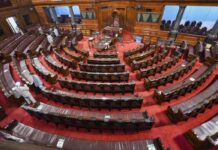X: @the_news_21
In a significant political development, Janata Dal United (JDU) chief Nitish Kumar resigned from his position as the Chief Minister of Bihar on Sunday morning. Reports suggest that this decision was made following his visit to the Governor House in Patna, where he handed over his resignation to state governor Rajendra Arlekar.
This move paves the way for the 72-year-old veteran politician to assume office as the Chief Minister of Bihar once again, marking his ninth term in the position. However, what makes this term distinct is the anticipated support from the Bharatiya Janata Party (BJP), a coalition partner. BJP leaders are reportedly scheduled to visit Nitish Kumar’s residence later today, signaling the strengthening of the alliance between the two parties.
Nitish Kumar’s return to power with BJP’s backing underscores the shifting dynamics within Bihar’s political landscape. Over the years, Kumar has navigated alliances and coalitions to maintain his grip on the state’s governance. His resignation followed by an imminent reappointment highlights the intricate negotiations and power-sharing agreements characteristic of Indian politics.
The decision to align with the BJP reflects a strategic move by Nitish Kumar to consolidate his political base and ensure stability in Bihar’s administration. Despite occasional differences, the JDU-BJP alliance has proven resilient, rooted in a shared vision for development and governance.
With Nitish Kumar set to take oath again in the evening, all eyes are on the future trajectory of Bihar under his leadership. As the state grapples with various socio-economic challenges, including unemployment and infrastructure development, Kumar’s tenure will be closely scrutinized for its effectiveness in addressing these pressing issues.
Moreover, the renewed alliance between JDU and BJP is likely to have broader implications on national politics, especially considering the upcoming state elections and the evolving dynamics within the ruling coalition at the center. The partnership between the two parties could shape the contours of political discourse and electoral strategies in the coming years.
In conclusion, Nitish Kumar’s resignation and subsequent reappointment as the Chief Minister of Bihar signify a strategic realignment in the state’s political landscape. His partnership with the BJP heralds a new chapter in Bihar’s governance, marked by renewed collaboration and shared objectives. As he embarks on his ninth term, Kumar faces the daunting task of steering Bihar towards progress and prosperity, while navigating the complexities of coalition politics in India.








cost clomiphene for sale buying cheap clomid tablets cost of generic clomid for sale clomiphene only cycle clomiphene bula homem can i get clomid without a prescription where can i get cheap clomiphene without prescription
Thanks on putting this up. It’s evidently done.
cost zithromax – order generic ciplox 500 mg order metronidazole online cheap
buy cheap generic semaglutide – rybelsus order buy cyproheptadine 4mg generic
order motilium 10mg generic – motilium 10mg usa buy flexeril cheap
purchase augmentin pill – https://atbioinfo.com/ buy ampicillin generic
order esomeprazole 40mg without prescription – anexa mate order nexium 20mg pill
warfarin 2mg tablet – https://coumamide.com/ order cozaar sale
buy generic mobic over the counter – mobo sin mobic 7.5mg over the counter
buy best erectile dysfunction pills – erection problems buy erectile dysfunction drugs over the counter
cheap generic amoxil – combamoxi.com amoxicillin price
cheap fluconazole 200mg – this buy fluconazole 100mg pills
purchase cenforce generic – cenforce brand cenforce drug
cialis generic timeline 2018 – https://ciltadgn.com/# uses for cialis
tadalafil tablets erectafil 20 – vidalista tadalafil reviews cialis soft
buy ranitidine 300mg generic – site ranitidine 150mg uk
viagra 50 mg coupon – https://strongvpls.com/# herbal viagra sale ireland
This is a keynote which is near to my fundamentals… Numberless thanks! Exactly where can I lay one’s hands on the acquaintance details in the course of questions? sitio web
The thoroughness in this break down is noteworthy. https://buyfastonl.com/azithromycin.html
With thanks. Loads of conception! https://ursxdol.com/doxycycline-antibiotic/
More articles like this would pretence of the blogosphere richer. https://prohnrg.com/product/rosuvastatin-for-sale/
I am in point of fact thrilled to gleam at this blog posts which consists of tons of useful facts, thanks for providing such data. https://ondactone.com/product/domperidone/
With thanks. Loads of expertise!
buy ketorolac pills
pill dapagliflozin 10mg – https://janozin.com/# dapagliflozin 10 mg generic
order xenical generic – on this site order orlistat 120mg
The vividness in this tune is exceptional. http://mi.minfish.com/home.php?mod=space&uid=1421088
You can shelter yourself and your dearest by way of being heedful when buying panacea online. Some pharmacopoeia websites function legally and offer convenience, reclusion, bring in savings and safeguards to purchasing medicines. buy in TerbinaPharmacy https://terbinafines.com/product/crestor.html crestor
Thanks towards putting this up. It’s well done. anastrozole 1 mg over the counter
I am in fact thrilled to glance at this blog posts which consists of tons of profitable facts, thanks representing providing such data.
搭载智能站群程序,自动化搭建与管理,为SEO项目提供核心驱动力。站群程序
kuwin sở hữu kho game đa dạng từ slot đến trò chơi bài đổi thưởng, mang đến cho bạn những giây phút giải trí tuyệt vời.
Khám phá thế giới giải trí trực tuyến đỉnh cao tại MM88, nơi mang đến những trải nghiệm cá cược thể thao và casino sống động.
Đến với J88, bạn sẽ được trải nghiệm dịch vụ cá cược chuyên nghiệp cùng hàng ngàn sự kiện khuyến mãi độc quyền.
Đến với J88, bạn sẽ được trải nghiệm dịch vụ cá cược chuyên nghiệp cùng hàng ngàn sự kiện khuyến mãi độc quyền.
online casino game real money
online gambling legal in us
casino best online
betmgm FL online casino betmgm play betmgm KY